Going Through Menopause? You May Want To Consider Adding A Protein Supplement To Your Diet
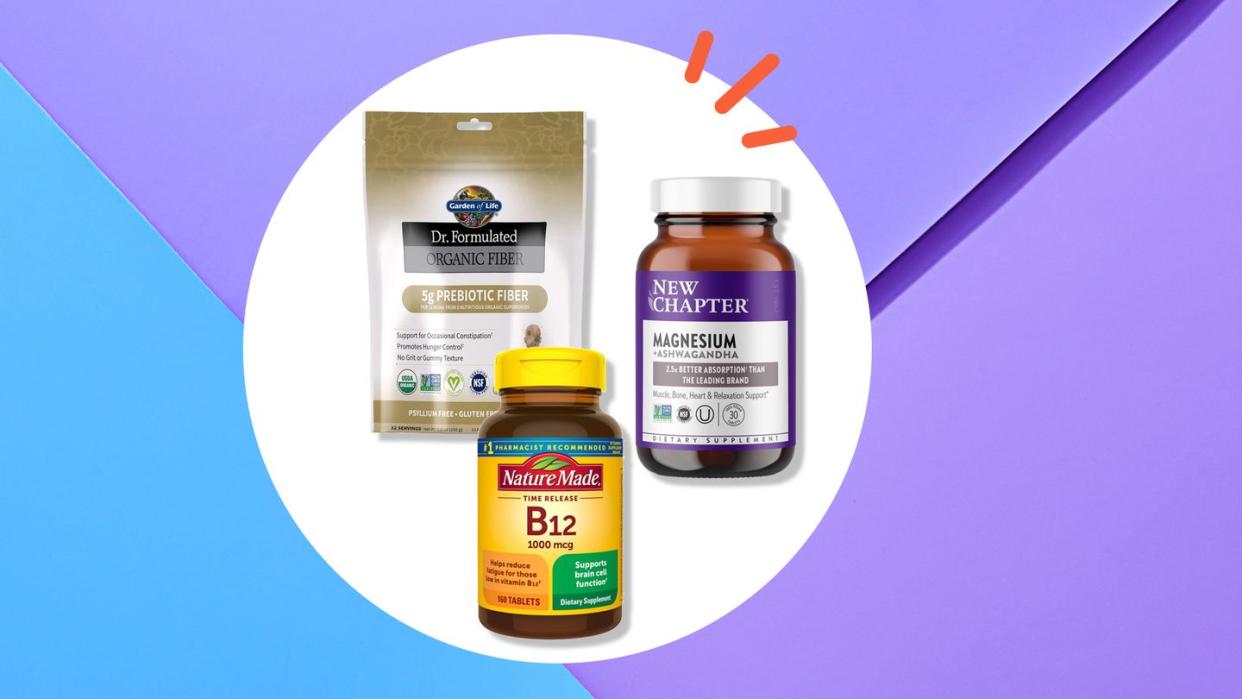
"Hearst Magazines and Yahoo may earn commission or revenue on some items through these links."
If you’ve always prioritized your health and wellness, chances are nutrition has also always been a part of that equation, including in the form of vitamins and supplements. There are tons of supplements marketed toward women in various stages of their life, from prenatal vitamins to take before and during pregnancy, to generic multivitamins to take for most of your adult years, and even multivitamins targeted to women ages 50+. But even though they may fall into that latter category, you’ve probably rarely heard about supplements to take specifically during menopause, which officially begins 12 months after you’ve had your last menstrual period.
Menopause typically takes place between the ages of 45 to 55, with the average age for U.S. women being 52. The period before menopause, in which the body is making the transition to this period, is called perimenopause and can last seven to 14 years. While in perimenopause, hormone levels (specifically estrogen and progesterone) will fluctuate, causing irregular and sometimes heavier periods, as well as other symptoms such as changes in mood, difficulty sleeping, hot flashes, sexual discomfort, lowered libido, weight gain, and a decrease in bone density.
This is where supplements may come in terms of helping to relieve symptoms. However, there unfortunately hasn’t been much research performed and published to show that supplements can be beneficial during menopause, likely due to the fact that symptoms can vary widely from person to person. That doesn’t mean that you may find certain things may work for you, though. Here, experts break down how you can properly prioritize your nutrition during menopause, as well as some dos and don’ts for taking supplements.
Why nutrition is so important during menopause
According to Mary Rosser, M.D., an ob-gyn at NewYork-Presbyterian/Columbia University Irving Medical Center, prioritizing nutrition, diet, and weight before and during menopause is especially important because the risk of being overweight or obese increases with the decline in estrogen that comes with perimenopause and menopause.
“Weight gain during the menopause transition appears to be mostly related to aging and lifestyle, [as well as ] a shift in body composition: a decrease in lean body mass, while peripheral fat is redistributed to the abdomen (mid-section) and thighs,” Dr. Rosser explains. Metabolic changes occur and metabolism also slows as a result of age and sedentary lifestyle, and healthy eating, including portion control and regular exercise, minimizes fat gain and maintains muscle.”
Hormones tend to be anti-inflammatory, so staying on top of core vitamins and minerals as well as omega-3 fatty acids is especially important for decreasing inflammation, adds Suzanne Gilberg-Lenz, M.D., an ob-gyn in Beverly Hills, California, and medical advisor of Evernow, a platform providing information on and treatments for menopause.
“In terms of weight management, during menopause, we’re more likely to lose muscle and we're more prone to blood sugar spikes,” Dr. Gilberg-Lenz says. “Increasing protein consumption can help preserve muscle while focusing on fiber as well as the timing of meals (including cutting down on frequent snacking) can help manage blood sugar.”
When to consider supplements for menopause
According to Dr. Rosser, in addition to not having been sufficiently researched, many supplements lack FDA approval at all, let alone for menopause treatment, which is why it’s important to always consult with your healthcare provider before adding any kind of over-the-counter treatment to your wellness routine.
“Supplements in the United States are generally not regulated like prescription therapies, and women should be aware of this issue,” she says. “Some manufacturers do have quality-control measures, but many products are not monitored for purity or exact levels of active ingredients.”
If you’re taking a lot of supplements, you should also keep your healthcare provider in the loop and stay on top of your regular labs and bloodwork to make sure you’re not triggering any negative side effects, Dr. Gilberg-Lenz says.
“You want to be particularly careful around anything that’s processed through the liver, as this can affect medicine absorption,” she says.
What to look for in supplements for menopause
Dr. Rosser recommends looking for menopause treatments that are FDA-approved, which most supplements won’t fall under, unfortunately. If you do consider supplements, Dr. Gilberg-Lenz advises seeking out those that have been third-party tested to ensure they haven’t been contaminated.
“There are a lot of supplements on the market, and you don’t always know what’s in them, which is problematic because regulations for these products are far less stringent than for other food categories,” she says. “You have to be especially careful about smaller purveyors and vendors and keep in mind that just because you follow them on Instagram doesn’t mean there’s consistent dosing or even that they contain what they say they do.”
Supplements *not* to take during menopause
The below supplements have sometimes been thought to be helpful for menopause, but Dr. Rosser advises against them for a variety of reasons.
Kava
Kava may decrease anxiety, but there is no evidence showing that it decreases hot flashes, whereas it has been associated with liver disease. Dr. Rosser says. It is important to note that kava has been associated with liver disease.
“The FDA has issued a warning to patients and providers about kava because of its potential to damage the liver,” she says.
Evening primrose oil
This botanical is also promoted to relieve hot flashes; however, the only randomized, placebo-controlled study (in only 56 women) found no benefit over placebo, Dr. Rosser says.
“Reported side effects include inflammation, problems with blood clotting and the immune system, nausea, and diarrhea,” she says. “Evening primrose oil has also been shown to induce seizures in patients diagnosed with schizophrenia who are taking antipsychotic medication. It should not be used with anticoagulants or phenothiazines (a type of psychotherapeutic agent).”
Plant-derived estrogens (phytoestrogens)
Plant-derived estrogens have been marketed as a "natural" or "safer" alternative to hormones for relieving menopausal symptoms, Dr. Rosser says. However, research hasn’t determined whether phytoestrogens help to reduce hot flashes or night sweats, as most studies have not reported benefits.
“Some phytoestrogens might also act like estrogen in some tissues of the body,” Dr. Rosser says. “Many experts suggest that people who have a history of breast cancer avoid phytoestrogens.”
Phytoestrogens are actually already found in many foods, including soybeans, chickpeas, lentils, flaxseed, lentils, grains, fruits, and vegetables, she adds.
Dong quai
Dong quai has been used in Traditional Chinese Medicine to treat gynecologic conditions for more than 1,200 years, Dr. Rosser says.
“However, only one randomized clinical study of dong quai has been conducted to determine its effects on hot flashes, and this botanical therapy was not found to be useful in reducing them, and some experts on Chinese medicine point out that the preparation studied was not the same as they use in practice,” she says. “Dong quai should never be used by women with fibroids or blood-clotting problems such as hemophilia, or by women taking drugs that affect clotting such as warfarin (Coumadin) as bleeding complications can result.”
Red clover
In five controlled studies, no consistent or conclusive evidence was found that red clover leaf extract reduces hot flashes, Dr. Rosser says. As with black cohosh, however, some women report that red clover has helped them.
“Studies report few side effects and no serious health problems with use,” she says. “But studies in animals have raised concerns that red clover might have harmful effects on hormone-sensitive tissue.”
8 menopause supplement options
Best for bone health: NatureWise Vitamin D3
Dr. Gilberg-Lenz typically tells her patients to have their vitamin D levels tested to make sure they’re at least 40 ng/mL to fight inflammation and boost bone health. If you don’t meet that level, your provider will likely recommend starting to supplement.
Best for sleep: ForestLeaf Advanced Magnesium Complex
Upon testing their levels, many people will find they need to increase their magnesium intake, and during menopause is no exception. According to Dr. Gilberg-Lenz, it’s important to keep in mind that there are different kinds of magnesium to choose from.
“Magnesium glycinate is helpful for sleep, which can be disrupted during menopause, as well as overall health,” she says. “Magnesium citrate [is helpful] for bowel health, while magnesium threonate [is good] for sleep and cognitive function.”
Best for heart health and beating inflammation: NOW Supplements Omega-3s
Omega-3 fatty acid supplements like flax oil and fish oil have long been thought to be beneficial for preserving cardiac health and reducing inflammation, Dr. Gilberg-Lenz says. This is especially important during menopause.
Best for vegans: MegaFood Vegan B-12
If you’re vegan, you may also want to look at B12 as part of your routine labs and bloodwork, Dr. Gilberg-Lenz says.
“If you’re taking metformin, you’ll likely want to be on a full vitamin B complex,” she adds.
Best for hot flashes:
Kindra Core
According to Dr. Gilberg-Linz, this supplement contains pycnogenol, which can be helpful for hot flashes, and ashwagandha for stress relief. The sleep version also contains melatonin.
Metagenics Estrovera
This plant-based supplement contains Russian rhubarb for hot flashes, as well as various probiotics with strains specific to gut or vaginal health, Dr. Gilberg-Linz says.
Nature’s Bounty Black Cohosh Root Pills
According to Dr. Rosser, many people use black cohosh for hot flashes, though studies of its effectiveness in reducing hot flashes have produced mixed results.
“Recent research suggests that black cohosh does not act like estrogen, as once thought, which reduces concerns about its effect on hormone-sensitive tissue (e.g., uterus, breast),” she says. “There have also been reports linking black cohosh to liver problems, which connection continues to be studied.”
Carlyle Ginseng Complex Capsules
Research has shown that ginseng may help with some menopausal symptoms, such as mood symptoms and sleep disturbances, and with one's overall sense of well-being, Dr. Rosser says. However, it has not been found to be helpful for hot flashes.
Other tips for relieving menopause symptoms
According to Dr. Rosser, everyone's experience with menopause is different, and each woman has her own unique set of menopause symptoms. In other words, what works for one person may not work as well for another, so it’s important to keep your doctor updated on what you’re experiencing and interested in trying.
“Strive for a generally healthy lifestyle and talk to friends and family about what has worked for them,” she says. “Keep a journal of your menstrual periods and symptoms to discuss with your clinician. You can then decide which symptoms are the most bothersome and target those with specific treatments.”
Frequently asked questions
What are some natural remedies for menopause symptoms?
Focusing on tweaking lifestyle factors, like maintaining a healthy diet, getting regular exercise, and maintaining good sleep hygiene are a good place to start when trying to find menopause symptom relief, Dr. Rosser says.
“Practice stress-reduction techniques such as deep breathing, meditation, yoga, and progressive muscle relaxation to help manage stress and anxiety,” she says.
Maintaining good hydration, dressing in layers to manage temperature fluctuations, avoiding triggers like spicy foods and caffeine, and using a fan or a cooling cloth may all help to alleviate hot flashes, she adds.
How can I treat menopause symptoms?
According to Dr. Rosser, medical treatments for menopause symptoms can include hormone therapy with estrogen and progesterone, or non-hormone therapy including SSRIs and fezolinetant.
If you’re experiencing vaginal dryness and discomfort, she recommends using a water-based lubricant or a vaginal moisturizer.
“If symptoms persist, talk to your healthcare provider about potential treatments,” she says. “Low-dose vaginal estrogen is a very effective treatment for vaginal dryness or pain with intercourse due to menopause and can be continued for many years after menopause because only minimal amounts get into the bloodstream.”
Hormone replacement therapy may also be recommended to alleviate severe menopausal symptoms, she adds. You can discuss this with your provider and review risks/benefits and your own personal risk factors.
Should I ask my doctor about menopause supplements?
Dr. Rosser emphasizes always using supplements with caution and discussing them with your healthcare provider.
“There is no magic bullet for the treatment of all menopause symptoms,” she says. “The goal is to minimize discomfort, enhance quality of life, and reduce harm.”
There are tons of supplements marketed toward women in various stages of their life, from prenatal vitamins to take before and during pregnancy to generic multivitamins to supplements that may help manage symptoms during menopause.
Menopause typically begins between the ages of 45 to 55, with the average age for U.S. women being 52, according to the National Institute on Aging. While in menopause and perimenopause (the menopausal transition), you may have irregular periods, as well as other symptoms such as changes in mood, difficulty sleeping, hot flashes, sexual discomfort, lowered libido, weight gain, and a decrease in bone density.
This is why some women start searching for menopause supplements in hopes of getting some fast-acting relief. However, there hasn’t been much research performed and published to show that supplements can be beneficial during menopause, likely due to the fact that symptoms can vary widely from person to person.
Here, experts break down how you can properly prioritize your nutrition during menopause, as well as some dos and don’ts for taking supplements.
Meet the experts: Suzanne Gilberg-Lenz, MD, is an ob-gyn in Beverly Hills, California, and medical advisor of Evernow, a platform providing information on and treatments for menopause. Mary Rosser, MD, is an ob-gyn at NewYork-Presbyterian/Columbia University Irving Medical Center.
Why Nutrition Is So Important During Menopause
“During menopause, we’re more likely to lose muscle and we're more prone to blood sugar spikes,” says Suzanne Gilberg-Lenz, MD, an ob-gyn in Beverly Hills, California, and medical advisor of Evernow, a platform providing information on and treatments for menopause. “Increasing protein consumption can help preserve muscle while focusing on fiber as well as the timing of meals (including cutting down on frequent snacking) can help manage blood sugar.” Prioritizing protein, as well as making sure you’re getting enough vitamin D, can also help mitigate bone loss.
Focusing on nutrition is also important because the chance of weight gain increases with the decline in estrogen that comes with perimenopause and menopause, says Mary Rosser, MD, an ob-gyn at NewYork-Presbyterian/Columbia University Irving Medical Center. “Weight gain during the menopause transition appears to be mostly related to aging and lifestyle, [as well as] a shift in body composition: a decrease in lean body mass, while peripheral fat is redistributed to the abdomen and thighs,” Dr. Rosser explains. “Metabolic changes occur and metabolism also slows as a result of age and sedentary lifestyle, and healthy eating, including portion control and regular exercise, minimizes fat gain and maintains muscle.”
Additionally, staying on top of core vitamins and minerals as well as omega-3 fatty acids (found in fatty fish) is especially important for decreasing inflammation, Dr. Gilberg-Lenz says. And, it’s possible to get relief from certain menopause symptoms, such as sleep disturbances and mood swings, by ensuring you're getting enough of the right nutrients, like magnesium (found in foods such as legumes, nuts, seeds, and spinach).
When To Consider Supplements For Menopause
The experts recommend prioritizing getting the nutrients you need through food, but if that's not possible for you (i.e., you don't eat any fatty fish for omega-3s, you're a vegan and don't get B12, you don't get enough sunlight and need a vitamin D supplement to support bone health), that's when a supplement might be something to bring up with your doctor.
In addition to not having been sufficiently researched, many supplements lack FDA regulation at all, let alone for menopause treatment, which is why it’s important to always consult with your healthcare provider before adding any over-the-counter treatment to your wellness routine, says Dr. Rosser,
If you’re taking supplements, you should also stay on top of your regular labs and bloodwork via your health care provider to make sure you’re not triggering any negative side effects, Dr. Gilberg-Lenz says. “You want to be particularly careful around anything that’s processed through the liver, as this can affect medicine absorption,” she says.
7 Menopause Supplements To Consider
Vitamin D3
Dr. Gilberg-Lenz typically tells her patients to have their vitamin D levels tested to make sure they’re sufficient to fight inflammation and boost bone health. If you don’t meet that level, your provider will likely recommend starting to supplement.
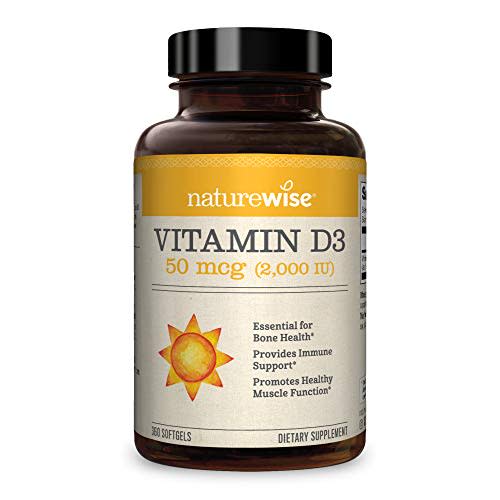
Vitamin D3
amazon.com
$14.49
naturewiseMagnesium + Ashwagandha Supplement
It’s important to keep in mind that there are different kinds of magnesium to choose from, says Dr. Gilberg-Lenz. “Magnesium glycinate is helpful for sleep, which can be disrupted during menopause, as well as overall health,” she says. “Magnesium citrate [is helpful] for bowel health, while magnesium threonate [is good] for sleep and cognitive function.”
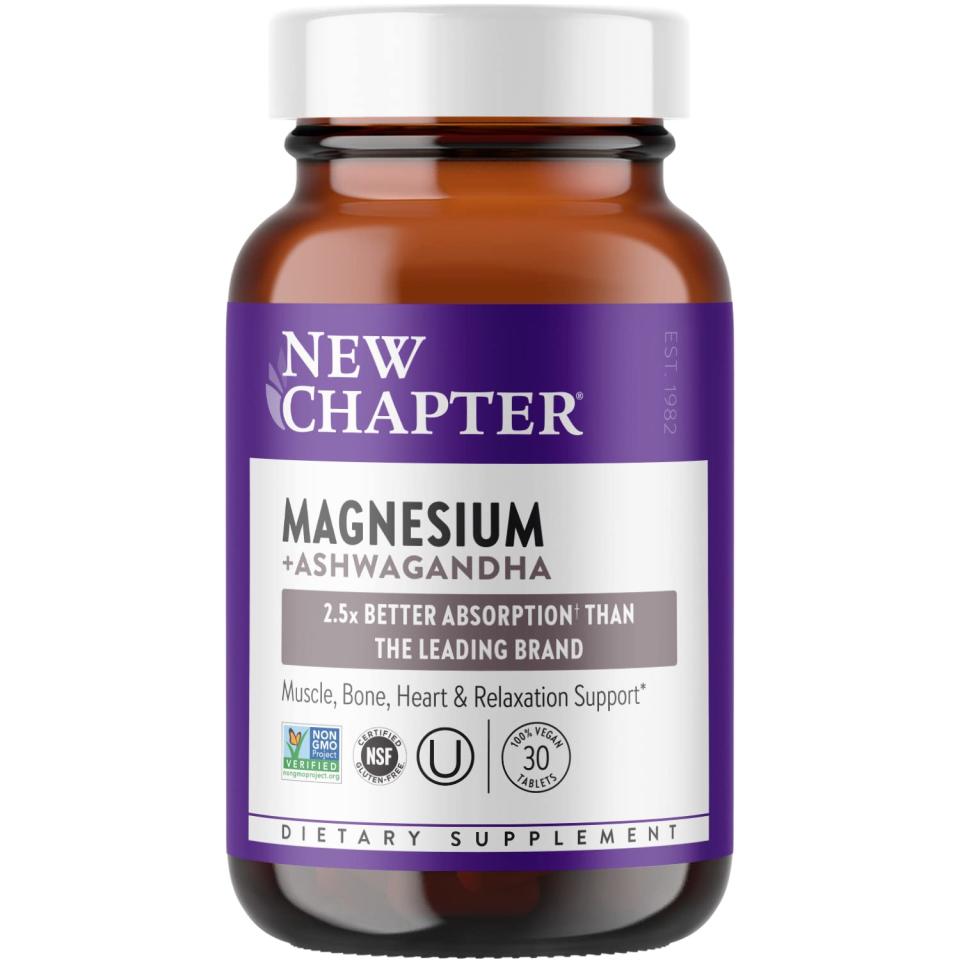
Magnesium + Ashwagandha Supplement
amazon.com
$13.97
New ChapterOmega-3 Softgels
Omega-3 fatty acid supplements like flax oil and fish oil have long been thought to be beneficial for preserving cardiac health and reducing inflammation, Dr. Gilberg-Lenz says. This is especially important during menopause.
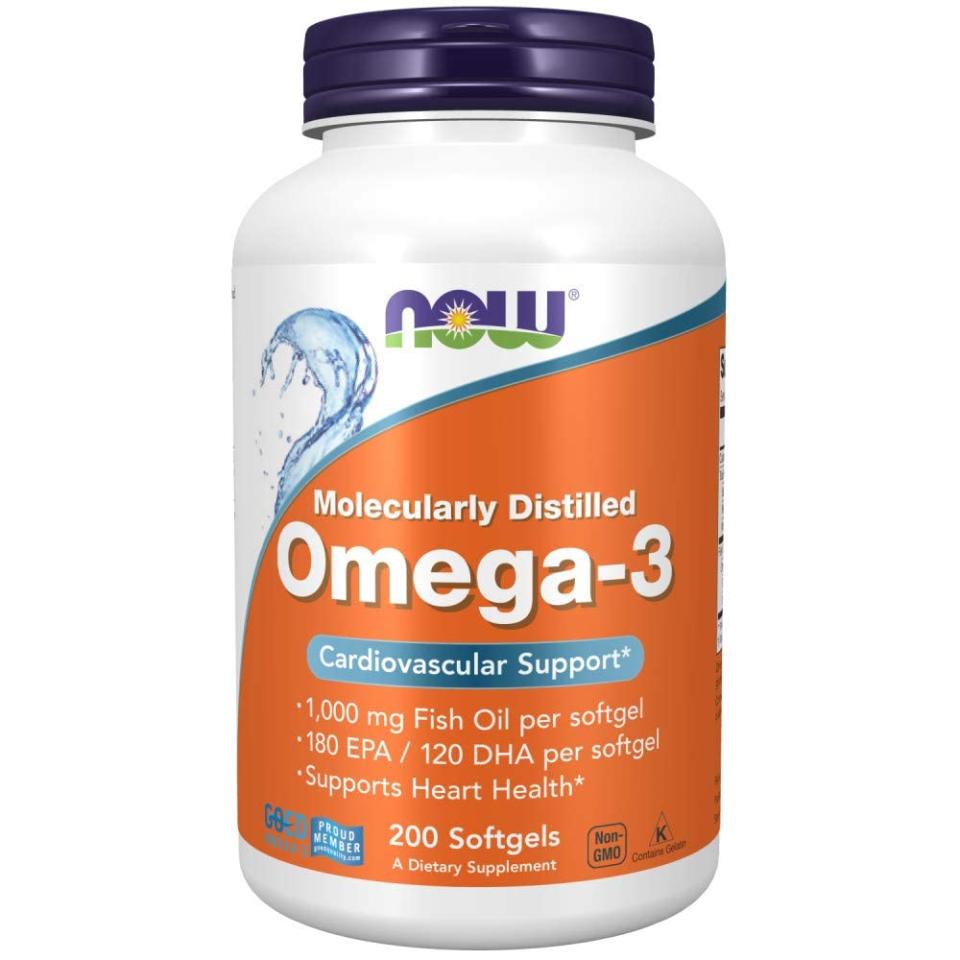
Omega-3 Softgels
amazon.com
$12.17
NOWVitamin B12
If you’re vegan, you may also want to look at B12 as part of your routine labs and bloodwork, Dr. Gilberg-Lenz says. Vitamin B12 promotes nerve function and bone health, and it’s also important for cognition, sleep, and mood, she says. “If you’re taking metformin, you’ll likely want to be on a full vitamin B complex,” she adds.
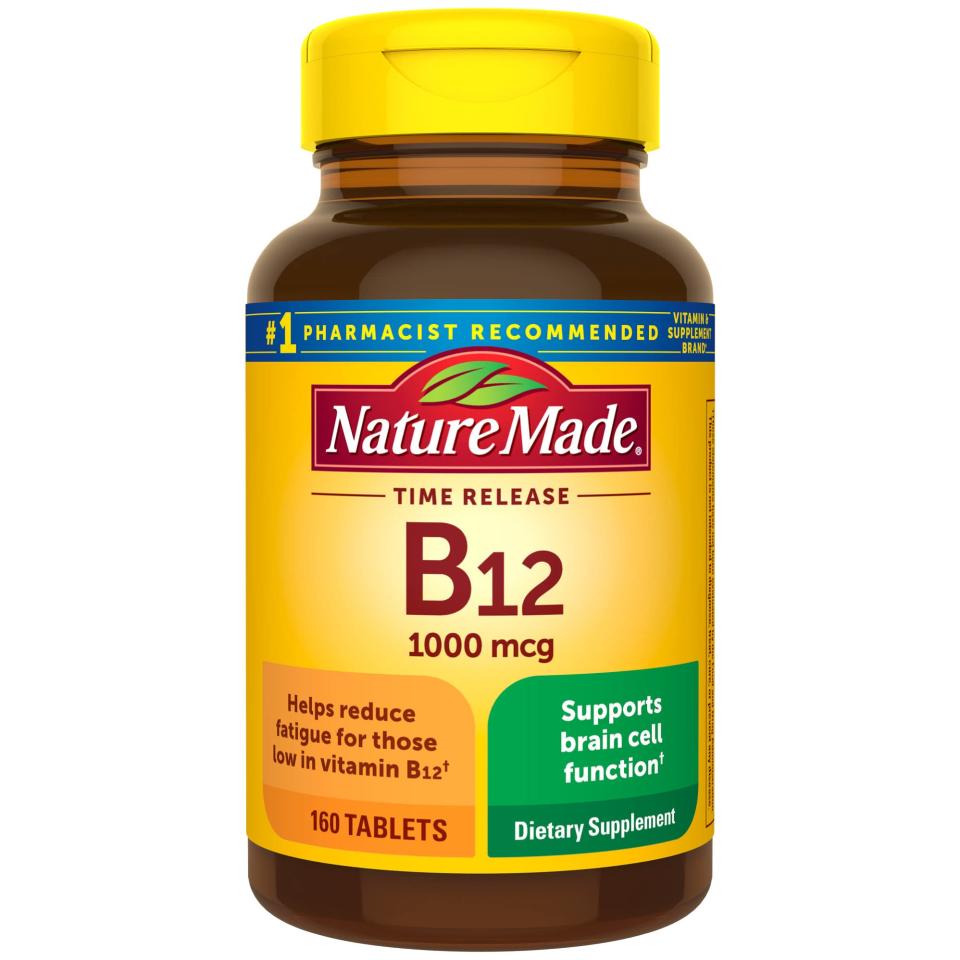
Vitamin B12
amazon.com
$9.98
NatureMadeSport Premium Vegan Protein Powder
Since prioritizing protein is especially important for preventing bone loss, supplementing with a protein powder is a great way to up your intake and is especially beneficial to do immediately after exercising. Dr. Gilberg-Lenz recommends choosing a protein powder with at least 20 grams of protein.
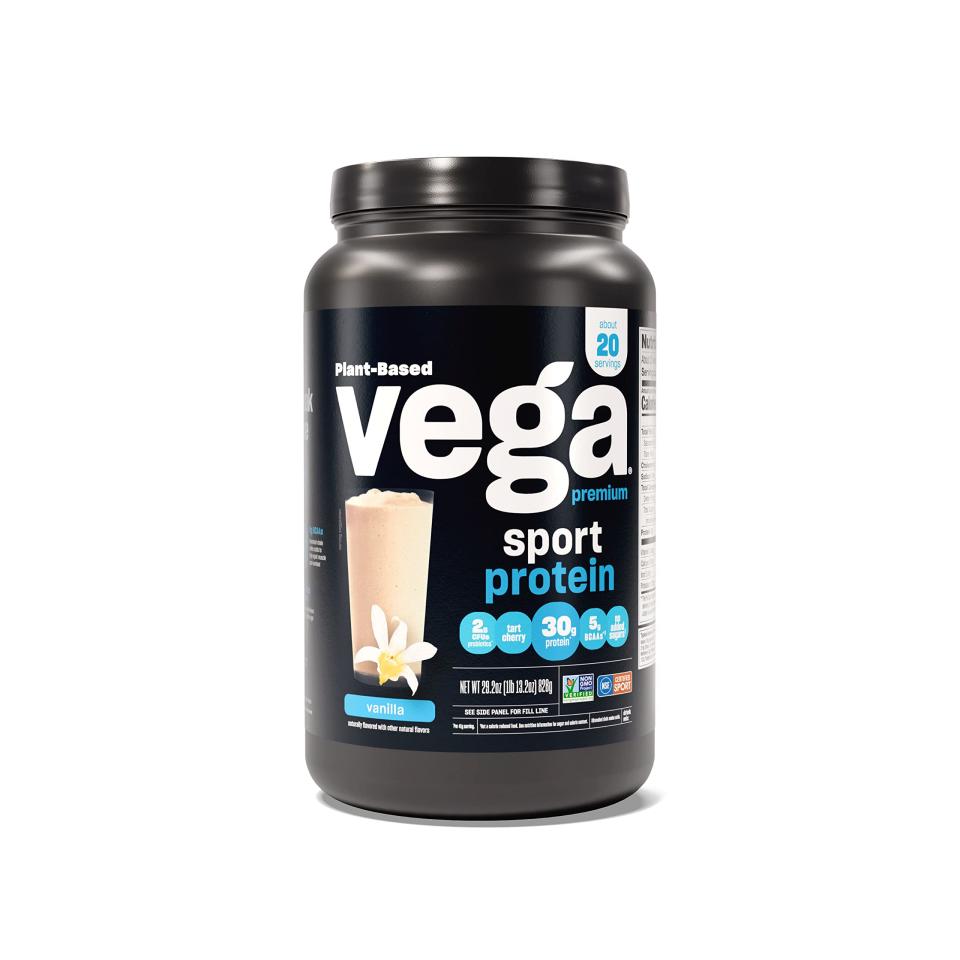
Sport Premium Vegan Protein Powder
amazon.com
$38.47
VegaDr Formulated Organic Fiber Supplement Powder
As Dr. Gilberg-Lenz noted, fiber can help control blood sugar. It can also play a role in digestion and satiety. This supplement contains five grams of prebiotic fiber per serving.
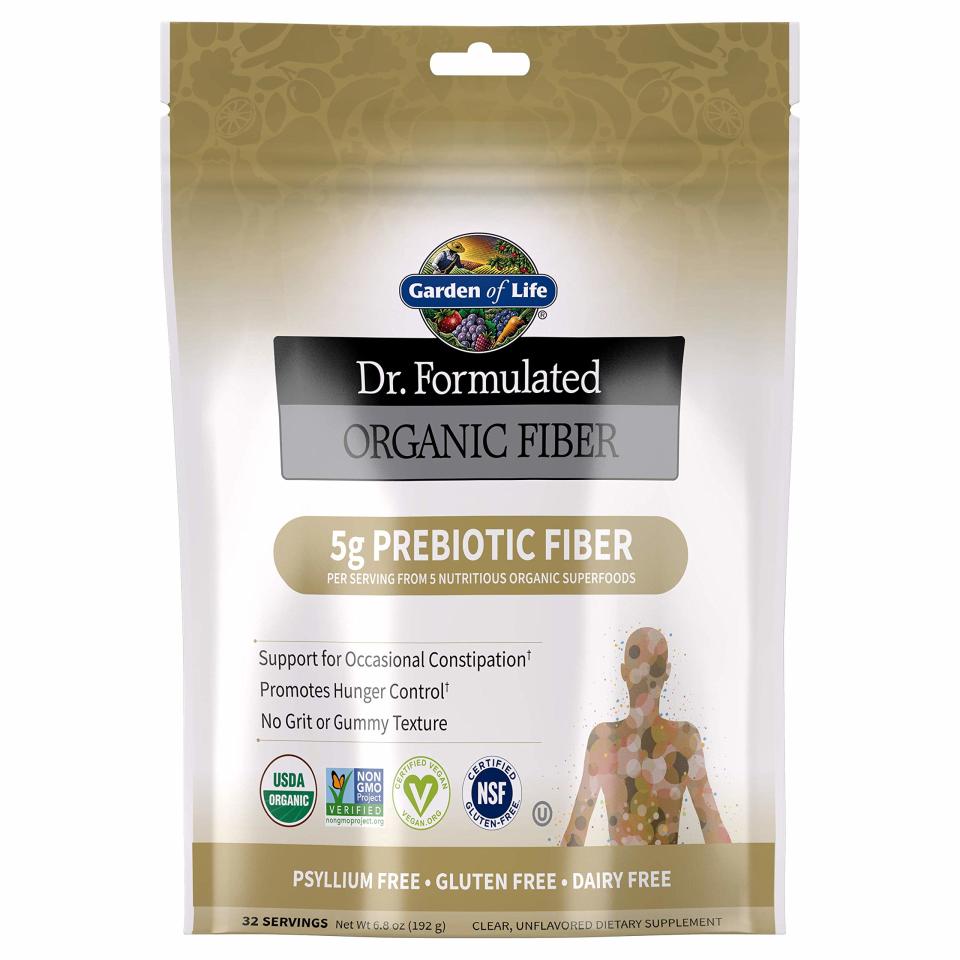
Dr Formulated Organic Fiber Supplement Powder
amazon.com
$15.94
Garden of LifeThe Core Dietary Supplement
According to Dr. Gilberg-Linz, who discloses that she is a medical advisor to Kindra, this supplement contains pycnogenol (or, pine bark extract), which may be helpful for hot flashes, and ashwagandha for stress relief.
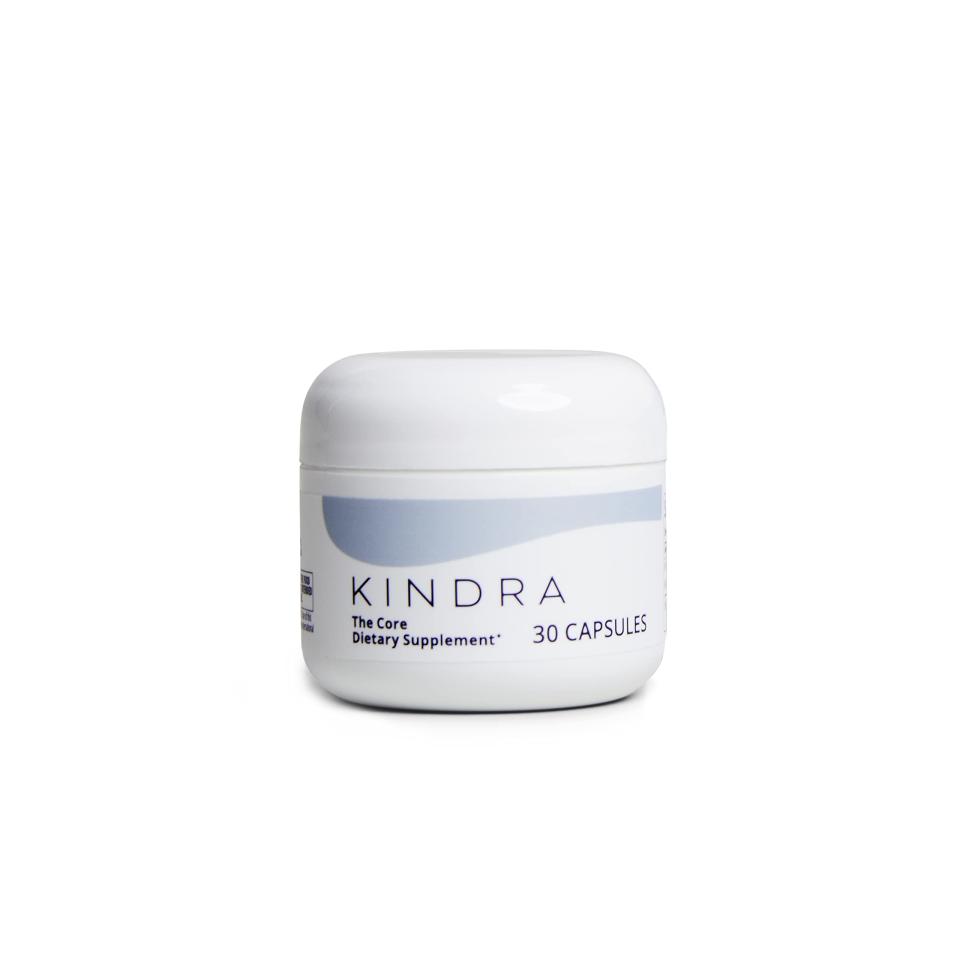
The Core Dietary Supplement
amazon.com
$49.00
KindraWhat To Look For In A Menopause Supplement
If you do consider supplements, Dr. Gilberg-Lenz advises seeking out those that have been third-party tested. Look for labels like the U.S. Pharmacopeia (USP) or National Science Foundation (NSF) seal. “There are a lot of supplements on the market, and you don’t always know what’s in them, which is problematic because regulations for these products are far less stringent than for other food categories,” she says.

Supplements To Avoid During Menopause
Certain supplements have sometimes been thought to be helpful for menopause, but Dr. Rosser advises against them for a variety of reasons. For example, kava has been said to decrease anxiety and hot flashes—but the FDA has issued a warning about kava because of its potential to damage the liver, according to NAMS.
When it comes to supplements like evening primrose oil, phytoestrogens, dong quai, red clover, and black cohosh, NAMS notes that there’s not conclusive research to support their potential benefits when it comes to menopause. And with some of these supplements, the potential side effects could be problematic. For example, side effects of evening primrose oil can include inflammation, problems with blood clotting and the immune system, nausea, and diarrhea, according to NAMS.

Natural Remedies For Menopause Symptoms
Focusing on tweaking lifestyle factors, like maintaining a healthy diet, getting regular exercise, and maintaining good sleep hygiene are a good place to start when trying to find menopause symptom relief, Dr. Rosser says. “Practice stress-reduction techniques such as deep breathing, meditation, yoga, and progressive muscle relaxation to help manage stress and anxiety,” she says.
Maintaining good hydration, dressing in layers to manage temperature fluctuations, avoiding triggers like spicy foods and caffeine, and using a fan or a cooling cloth may all help to alleviate hot flashes, she adds.

Menopause Management Tips
Medical treatments for menopause symptoms can include hormone therapy with estrogen and progesterone, or non-hormone therapy including SSRIs and fezolinetant, according to Dr. Rosser.
If you’re experiencing vaginal dryness and discomfort, she recommends using a water-based lubricant or a vaginal moisturizer.
“If symptoms persist, talk to your healthcare provider about potential treatments,” she says. “Low-dose vaginal estrogen is a very effective treatment for vaginal dryness or pain with intercourse due to menopause and can be continued for many years after menopause because only minimal amounts get into the bloodstream.”
Hormone replacement therapy may also be recommended to alleviate severe menopausal symptoms, she adds. You can discuss this with your provider and review risks/benefits and your own personal risk factors.

You Might Also Like

